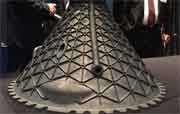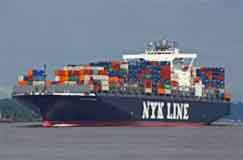| |
|
| |
|
 |
Supply
Chain by the Numbers |
| |
|
| |
- Nov. 3, 2016 -
|
| |
|
| |
|
| |
|
| |
GE Aircraft Turning 3D Printing Vision Into Reality; Unilever Signs Big Deal with Uber for Trucking Provider; NYK LIne Takes Huge Write Down on Ship Value, Others Likely to Follow; the Robots will Takeover in Next Recession |
| |
|
| |
| |
| |
$1 Billion |

|
|
|
| |
| |
|
10 Million
|
 |
That's how many manufacturing jobs have been lost in the US during recessionary periods since the late 1960s. What is really interesting is that in non-recession times over that same period, US manufacturing has seen a gain of employment of 4 million. The easy math says the overall effect has been a loss of some 6 million factory-related jobs over the past almost 50 years. The key point, says Derek Thompson in The Atlantic magazine this week, is that while for now the incredible advances in robotics have not yet resulted in mass job losses as many have predicted, and indeed US manufacturing employment is up slightly since the end of the Great Recession in 2009, it could be that the impact of technology will not really be felt until the next downturn, which some economists - such as Jason Schenker of Prestige Economics - expect to happen in 2017. "Automation is not a gradually applied force," Thompson writes. "Instead, labor-replacing automation seems to operate like the famous description of bankruptcy - slowly, slowly - and then all at once." Yikes! |
| |
| |
|
| |
| |
25% |
 |
That was approximately the amazing write-down on the value of its ship assets that Japanese ocean container carrier NYK Line took a couple of weeks ago in the face of the dismay financial situation the industry is facing. However, that turned out to be right before NYK Line announced a plan to merge with two other Japanese carriers - Mitsui O.S.K. Lines and Kawasaki Kisen Kaisha - fierce rivals that many thought would not join a single alliance (which they did earlier this year) let alone merge. Such is the power of financial turmoil. On the write-down, NYK said that it has "reassessed its outlook for the market from a conservative perspective, and, as a result, deemed it necessary to record an impairment loss as well as a provision for losses related to contracts in connection with its container ships." Not good. All this of course follows the recent bankruptcy of South Korea's Hanjin Shipping Co. NYK may be the first but likely not the only carrier to take such a write down - Alphaliner estimates the top 18 carriers may need to write off some $35 billion of the value of their ships. We hope you've already sold the stock. |
| |
| |
|
|
|
| |
 |
 |
| |
|
|
| |